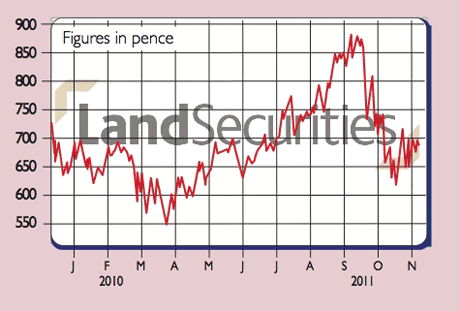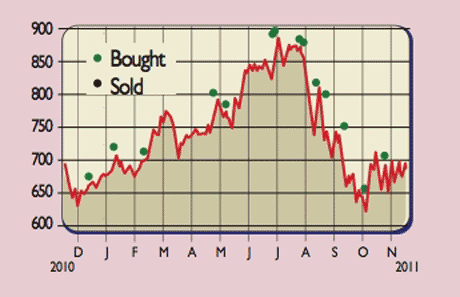Tough times ahead for Britain’s biggest landlord
Land Securities is Britain's biggest landlord. But with the commercial property sector in the doldrums, is now the time to buy? Phil Oakley investigates.
Get the latest financial news, insights and expert analysis from our award-winning MoneyWeek team, to help you understand what really matters when it comes to your finances.
You are now subscribed
Your newsletter sign-up was successful
Want to add more newsletters?

Twice daily
MoneyWeek
Get the latest financial news, insights and expert analysis from our award-winning MoneyWeek team, to help you understand what really matters when it comes to your finances.

Four times a week
Look After My Bills
Sign up to our free money-saving newsletter, filled with the latest news and expert advice to help you find the best tips and deals for managing your bills. Start saving today!
What is it?
Land Securities (LAND) is a UK real-estate investment trust (Reit). The business is focused on two distinct areas. The retail portfolio consists of approximately 20.6 million square feet of space, including 25 shopping centres and 20 retail parks, plus 29 Ibis and Novotel hotels. Its London portfolio is focused on office accommodation in the West End and the City, plus central London shops. The company receives rental income from its properties. It also buys and develops land to make a profit. Its property portfolio is currently valued at £10.9bn.
What is the company's history?
Harold Samuel founded the company in 1944 when he bought the Land Securities Investment Trust, which owned three houses in Kensington. The initial focus was on properties in London's West End, but by the 1950s and 1960s it had also invested in shopping centres and industrial assets. The early 1970s saw the company struggle as rents were frozen and taxes on property increased. Growth resumed in the 1980s, but by the end of the decade the recession had seen asset values fall sharply. Under the current chief executive, Francis Salway, the company converted to Reit status in 2007. The 2008 recession stretched the company's finances, generating a £755m rights issue in 1990.
Who runs it?
Salway has been CEO since 2004; he left Standard Life Investments in 2000. His pay was £1.4m in 2010. Martin Greenslade is chief financial officer and Alison Carnwath is chairman.
MoneyWeek
Subscribe to MoneyWeek today and get your first six magazine issues absolutely FREE

Sign up to Money Morning
Don't miss the latest investment and personal finances news, market analysis, plus money-saving tips with our free twice-daily newsletter
Don't miss the latest investment and personal finances news, market analysis, plus money-saving tips with our free twice-daily newsletter
How is trading?
For the six months to 30 September 2011, underlying pre-tax profit increased by 17.2% to £159.3m, with earnings per share up by 16.5% to 20.5p. The interim dividend was increased by 2.9% to 14.4p. Underlying rental income in both the retail and London portfolios was slightly lower than a year ago. However, the percentage of vacant properties was reduced to 3.4% while lower interest rates lifted the valuation of the property portfolio by £211m. The net asset value per share increased to 863p.
What's the outlook?
The West End office portfolio looks well supported, but the outlook for the City offices and London shops is more mixed due to a weakening economy. The growth in online shopping does not bode well for the retail portfolio, although there is increased demand from food retailers. High yields on some of the group's development properties suggest these could be sold for a healthy profit. However, an interest-rate rise would hit valuations.
The analysts
Of the 21 analysts surveyed by Bloomberg, 14 say "buy", four "hold" and three "sell". The average price target is 811p 18% above the current share price. Most bullish is Deutsche Bank with a 960p price target, whereas Socit Gnrale is most bearish with a 640p target.
Our view
Despite trading at a discount to net asset value, the weak outlook for rental income and the firm's exposure to the retail sector means that the 4.2% dividend yield is not attractive enough. Avoid.
The numbers

Stockmarket code: LAND
Share price 689p
Market cap: £5.4bn
Net assets (Sept 2011) £6.7bn
Net debt (Sept 2011) £3.3bn
P/e (current year estimate) 18.5x
Yield (prospective) 4.2%
Directors' dealings

Chief financial officer Martin Greenslade bought £70,000 worth of stock in July 2011, while non-executive directors Simon Palley and Kevin O'Byrne respectively spent £108,000 and £64,000 on shares in December 2010.
The chief executive must hold twice his base salary in shares and other executivedirectors must hold 1.5 times base salary. Recent deals are shown in the chart on the left; shareholdings in the table below.
Director and shares held
F Salway: 1,025,897
M Greenslade: 633,905
R Akers: 633,369
A Carnwath: 126,157
R Noel: 48,660
Get the latest financial news, insights and expert analysis from our award-winning MoneyWeek team, to help you understand what really matters when it comes to your finances.
Phil spent 13 years as an investment analyst for both stockbroking and fund management companies.
-
 Early signs of the AI apocalypse?
Early signs of the AI apocalypse?Uncertainty is rife as investors question what the impact of AI will be.
-
 Reach for the stars to boost Britain's space industry
Reach for the stars to boost Britain's space industryopinion We can’t afford to neglect Britain's space industry. Unfortunately, the government is taking completely the wrong approach, says Matthew Lynn